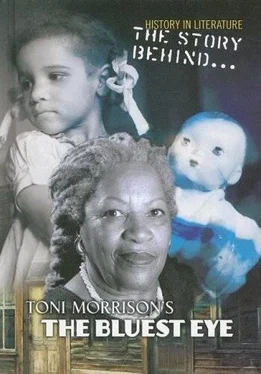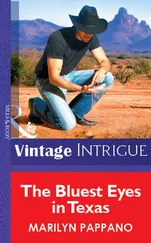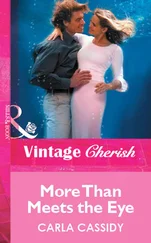What are you doing walking through my yard?" The girl stopped.
"Nobody can come through this yard 'less I say so."
"This ain't your yard. It's the school's."
"But I'm in charge of it." The girl started to walk away. "Wait." Junior walked toward her. "You can play in it if you want to. What's your name?"
"Pecola. I don't want to play."
"Come on. I'm not going to bother you."
"I got to go home."
"Say, you want to see something? I got something to show you."
"No. What is it?"
"Come on in my house. See, I live right there. Come on. I'll show you."
"Show me what?"
"Some kittens. We got some kittens. You can have one if you want."
"Real kittens?"
"Yeah. Come on." He pulled gently at her dress.
Pecola began to move toward his house. When he knew she had agreed, Junior ran ahead excitedly, stopping only to yell back at her to come on. He held the door open for her, smiling his encouragement. Pecola climbed the porch stairs and hesitated there, afraid to follow him. The house looked dark. Junior said, "There's nobody here. My ma's gone out, and my father's at work.
Don't you want to see the kittens?" Junior turned on the lights.
Pecola stepped inside the door. How beautiful, she thought. What a beautiful house. There was a big red-and-gold Bible on the dining-room table. Little lace doilies were everywhere-on arms and backs of chairs, in the center of a large dining table, on little tables. Potted plants were on all the windowsills. A color picture of Jesus Christ hung on a wall with the prettiest paper flowers fastened on the frame. She wanted to see everything slowly, slowly. But Junior kept saying, "Hey, you. Come on. Come on." He pulled her into another room, even more beautiful than the first. More doilies, a big lamp with green-and-gold base and white shade. There was even a rug on the floor, with enormous dark-red flowers. She was deep in admiration of the flowers when Junior said, "Here!" Pecola turned. "Here is your kitten!" he screeched. And he threw a big black cat right in her face. She sucked in her breath in fear and surprise and felt fur in her mouth. The cat clawed her face and chest in an effort to right itself, then leaped nimbly to the floor. Junior was laughing and running around the room clutching his stomach delightedly. Pecola touched the scratched place on her face and felt tears coming. When she started toward the doorway, Junior leaped in front of her. "You can't get out. You're my prisoner," he said. His eyes were merry but hard. "You let me go."
"No!" He pushed her down, ran out the door that separated the rooms, and held it shut with his hands. Pecola's banging on the door increased his gasping, high-pitched laughter. The tears came fast, and she held her face in her hands. When something soft and furry moved around her ankles, she jumped, and saw it was the cat. He wound himself in and about her legs. Momentarily distracted from her fear, she squatted down to touch him, her hands wet from the tears. The cat rubbed up against her knee. He was black all over, deep silky black, and his eyes, pointing down toward his nose, were bluish green. The light made them shine like blue ice. Pecola rubbed the cat's head; he whined, his tongue flicking with pleasure. The blue eyes in the black face held her. Junior, curious at not hearing her sobs, opened the door, and saw her squatting down rubbing the cat's back. He saw the cat stretching its head and flattening its eyes. He had seen that expression many times as the animal responded to his mother's touch. "Gimme my cat!" His voice broke. With a movement both awkward and sure he snatched the cat by one of its hind legs and began to swing it around his head in a circle. "Stop that!"
Pecola was screaming. The cat's free paws were stiffened, ready to grab anything to restore balance, its mouth wide, its eyes blue streaks of horror. Still screaming, Pecola reached for Junior's hand. She heard her dress rip under her arm. Junior tried to push her away, but she grabbed the arm which was swinging the cat. They both fell, and in falling, Junior let go the cat, which, having been released in mid-motion, was thrown full force against the window. It slithered down and fell on the radiator behind the sofa. Except for a few shudders, it was still. There was only the slightest smell of singed fur.
Geraldine opened the door. "What is this?" Her voice was mild, as though asking a perfectly reasonable question. "Who is this girl?"
"She killed our cat," said Junior. "Look." He pointed to the radiator, where the cat lay, its blue eyes closed, leaving only an empty, black, and helpless face. Geraldine went to the radiator and picked up the cat. He was limp in her arms, but she rubbed her face in his fur. She looked at Pecola. Saw the dirty torn dress, the plaits sticking out on her head, hair matted where the plaits had come undone, the muddy shoes with the wad of gum peeping out from between the cheap soles, the soiled socks, one of which had been walked down into the heel of the shoe. She saw the safety pin holding the hem of the dress up. Up over the hump of the cat's back she looked at her. She had seen this little girl all of her life. Hanging out of windows over saloons in Mobile, crawling over the porches of shotgun houses on the edge of town, sitting in bus stations holding paper bags and crying to mothers who kept saying "Shet up!" Hair uncombed, dresses falling apart, shoes untied and caked with dirt. They had stared at her with great uncomprehending eyes. Eyes that questioned nothing and asked everything. Unblinking and unabashed, they stared up at her. The end of the world lay in their eyes, and the beginning, and all the waste in between. They were everywhere. They slept six in a bed, all their pee mixing together in the night as they wet their beds each in his own candy-and-potato-chip dream. In the long, hot days, they idled away, picking plaster from the walls and digging into the earth with sticks. They sat in little rows on street curbs, crowded into pews at church, taking space from the nice, neat, colored children; they clowned on the playgrounds, broke things in dime stores, ran in front of you on the street, made ice slides on the sloped sidewalks in winter. The girls grew up knowing nothing of girdles, and the boys announced their manhood by turning the bills of their caps backward. Grass wouldn't grow where they lived. Flowers died. Shades fell down. Tin cans and tires blossomed where they lived. They lived on cold black-eyed peas and orange pop. Like flies they hovered; like flies they settled. And this one had settled in her house. Up over the hump of the cat's back she looked. "Get out," she said, her voice quiet. "You nasty little black bitch. Get out of my house." The cat shuddered and flicked his tail. Pecola backed out of the room, staring at the pretty milk-brown lady in the pretty gold-and-green house who was talking to her through the cat's fur. The pretty lady's words made the cat fur move; the breath of each word parted the fur. Pecola turned to find the front door and saw Jesus looking down at her with sad and unsurprised eyes, his long brown hair parted in the middle, the gay paper flowers twisted around his face. Outside, the March wind blew into the rip in her dress. She held her head down against the cold. But she could not hold it low enough to avoid seeing the snowflakes falling and dying on the pavement.
The first twigs are thin, green, and supple. They bend into a complete circle, but will not break. Their delicate, showy hopefulness shooting from forsythia and lilac bushes meant only a change in whipping style. They beat us differently in the spring.
Instead of the dull pain of a winter strap, there were these new green switches that lost their sting long after the whipping was over. There was a nervous meanness in these long twigs that made us long for the steady stroke of a strap or the firm but honest slap of a hairbrush. Even now spring for me is shot through with the remembered ache of switchings, and forsythia holds no cheer.
Читать дальше











